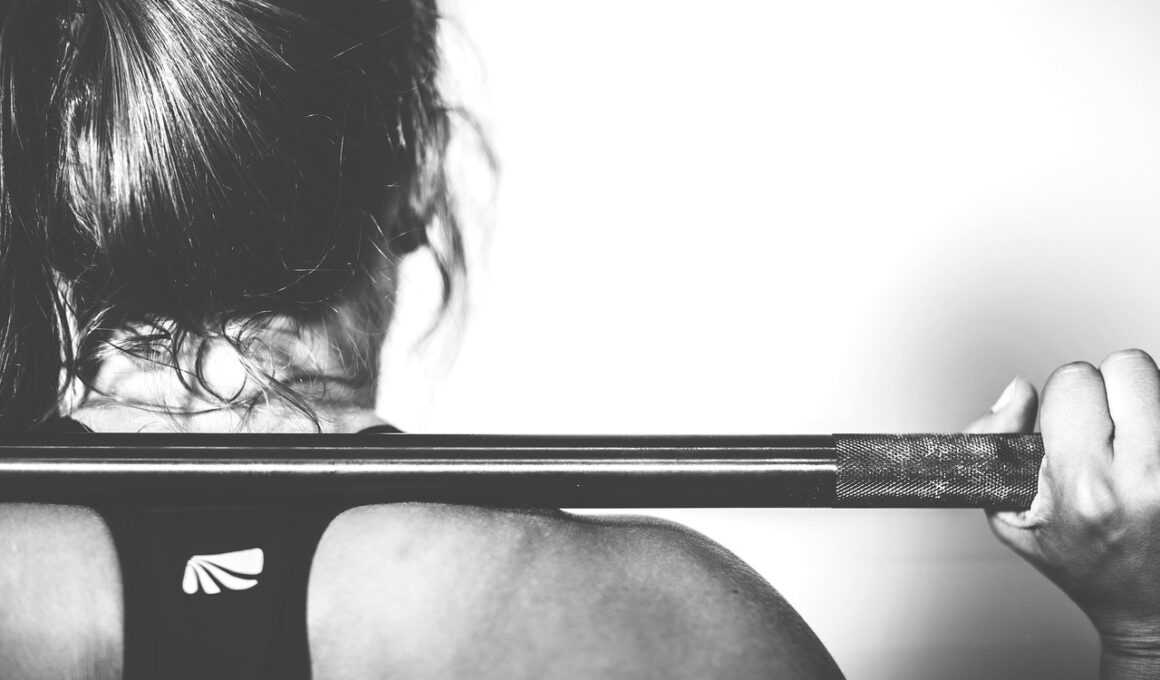The Role of Mental Strength in CrossFit Training and Competitions
In the realm of CrossFit, where physical endurance and strength are put to the test, the importance of mental strength cannot be overstated. Mental strength acts as a foundation upon which physical skills are built. It is crucial for athletes to develop resilience, focus, and a winning mindset to overcome obstacles in training and competition. Athletes often face challenges that stress both their physical and mental limits. Those who possess mental fortitude are better equipped to manage fatigue and maintain performance during intense workouts. Research shows that mental preparedness enhances physical performance by promoting focus and reducing anxiety. As athletes push through complex movements and fatigue, their psychology becomes a significant factor in their overall resilience. Cultivating mental strength involves strategies like visualization, positive self-talk, and setting achievable goals. These techniques help athletes maintain motivation and commitment to their training regimen, ensuring they push through when the going gets tough. Ultimately, mental strength uniquely influences performance and championship outcomes in CrossFit. This perspective is crucial for understanding the role of psychology in athletic competition.
Another vital aspect of mental strength is its correlation with goal achievement in CrossFit. Setting specific, measurable, achievable, relevant, and time-bound goals can motivate athletes to push their limits. Mental fortitude helps participants remain focused on their objectives, even when facing difficulties or setbacks. By reinforcing commitment to their training programs, athletes cultivate discipline and perseverance. Additionally, mental strength allows individuals to manage distractions effectively during workouts and competitions. Learning to reduce external and internal distractions can significantly enhance performance outcomes. Techniques like mindfulness and meditation empower athletes to stay in the moment, increasing concentration. Furthermore, mental resilience encourages athletes to view failures as opportunities for growth rather than roadblocks. This perspective fosters an environment where learning and improvement are prioritized, enabling athletes to thrive in demanding situations. Incorporating mental training practices alongside physical training ultimately leads to a holistic approach to CrossFit. Athletes should prioritize developing both physical and mental capabilities to maximize their success. When endurance meets mental strength, the results can be truly remarkable. This balance between mind and body is essential for achieving peak performance.
Overcoming Challenges through Mental Toughness
One of the distinctive features of CrossFit is the sheer challenge its workouts present to participants. Every workout is designed to push athletes to their limits, creating both physical and mental hurdles. Mental toughness is essential for overcoming these obstacles, allowing athletes to persevere when faced with challenging workouts. Developing this quality involves consistently pushing oneself out of their comfort zone. Embracing this discomfort enables athletes to grow and adapt, leading to greater success both in training and competition. By cultivating resilience, athletes learn to push through the struggles and find solutions in tough situations. The ability to ignore pain and fatigue is part of what defines the elite CrossFit athlete’s mentality. Techniques such as affirmations and imagery can cultivate a winning mindset that elevates athletes in their performance. Engaging with a supportive community also plays a critical role in developing this strength. CrossFit encourages camaraderie among participants, and shared experiences can serve as powerful motivators. This collective support enables individuals to face their challenges head-on, reinforcing the belief that they can conquer any obstacle laid before them.
Moreover, personal experiences deeply influence an athlete’s mental strength. Coaches and trainers play a significant role in cultivating this attribute, providing guidance and support tailored to individual needs. By encouraging athletes to set personal benchmarks and celebrate small victories, coaches foster an environment of confidence and growth. Effective coaching techniques can help athletes recognize their potential and challenge their mental barriers. Psychological preparation, such as visualization or mental rehearsal leading up to competitions, equips athletes with the tools necessary to succeed on competition day. This proactive approach to mental training can directly impact performances, fostering a sense of confidence and skill. A positive mindset allows athletes to embrace nerves as a source of energy rather than a hindrance. This shift in perspective can make all the difference during high-pressure moments. In competitions, when pressure mounts, mental strength becomes a defining factor. It can mean the difference between success and failure. Athletes must harness their mental strengths to perform at their best when it matters most, making mental preparation an indispensable facet of success in CrossFit.
The Role of Community in Mental Strength
Community plays a vital role in reinforcing the significance of mental strength in CrossFit. Athletes often find strength in their fellow CrossFitters, providing empathy and encouragement that can bolster individual mental resilience. The positive atmosphere within CrossFit gyms cultivates an environment conducive to personal growth. Working alongside others, athletes are inspired by group dynamics and have opportunities for shared improvement. CrossFit fosters a sense of belonging, helping individuals embrace challenges collectively. These social connections reduce feelings of isolation and boost morale. Community members motivate one another during difficult workouts, offering support that can make a profound difference in performance. Furthermore, sharing experiences with others normalizes challenges while emphasizing the journey of overcoming them. This process encourages athletes to invest in their mental training seriously. Connecting with peers dedicating themselves to mental fortitude strategies can enhance an individual’s commitment and understanding. All together, these elements create an environment of accountability that upholds mental strength as crucial for success. Experiences exchanged within this community can lead to innovative approaches for enhancing mental prowess, solidifying the bond between physical and mental training.
In conclusion, mental strength is a fundamental aspect of CrossFit training and competition. It encompasses an athlete’s ability to face challenges with resilience, focus, and determination, often pushing them beyond their perceived limits. As previously discussed, cultivating mental strength can involve a variety of strategies, including goal-setting, visualization, and community engagement. These elements intertwine to create a comprehensive framework that not only supports physical development but also ensures mental preparedness. Athletes can experience transformation in their performances by fostering mental strength through proactive measures and shared experiences with their peers. A holistic approach to training empowers athletes to excel in both competitions and day-to-day workouts. Achieving optimal performance during challenging workouts and competitions is inherently connected to mental skill development. Coaches, athletes, and the community as a whole should prioritize fostering both physical capability and mental strength. Embracing this balance ultimately leads to greater outcomes in CrossFit, allowing athletes to embody the true spirit of the sport. This dedication toward mental fortitude encourages continual growth, establishing CrossFit as a platform for exceptional achievement and lasting success.
Recognizing the importance of mental strength encourages athletes to integrate it into their daily practices. The meticulous approach toward cognitive resilience will distinguish successful individuals from those still learning to overcome mental barriers. Regular training that challenges both the mind and body serves as an essential element in a CrossFit athlete’s routine. It further emphasizes that success is not solely about physical power, but also involves mental mastery that fosters determination and commitment. As documented, successful athletes continuously learn effective ways to harness their mental strength for performance advantages. The journey of self-discovery through CrossFit can be both rewarding and empowering. Embracing challenges through fitness cultivates a mentality that transcends the sport, positively affecting multiple life areas. When athletes apply lessons learned in CrossFit to their personal lives, they bring newfound strength and resilience into other facets, such as work and relationships. Developing mental strength through athletic experiences creates an ongoing cycle of growth and transformation. This overlapping growth process becomes instrumental in athletes’ overall journey, reinforcing the notion that resilience is rooted in both mental and physical dimensions.
In closing, mental strength emerges as a critical factor that influences the journey of every CrossFit athlete. Building this unique strength symbolizes personal growth and empowerment, where athletes unlock new depths of performance through reflection and learning. Recognizing mental fortitude is essential encourages meaningful conversations within and among the CrossFit community. By educating athletes on mental training techniques, the overall ethos of CrossFit can embrace a well-rounded perspective on strength. This shift aligns with the core philosophy of CrossFit: to challenge oneself and inspire others. Mental resilience should coexist with physical training as integral aspects of the overall development of athletes. The lessons learned in CrossFit about mental strength can empower athletes to face challenges courageously, extending beyond the gym environment. Ultimately, as athletes develop both mind and body, they embody the principles of resilience, focus, and determination that define successful individuals. The path toward mastery in CrossFit acknowledges that it is not merely a test of physicality but a journey through mental landscapes. This exploration uniquely shapes each athlete’s identity and experience within the CrossFit community.


